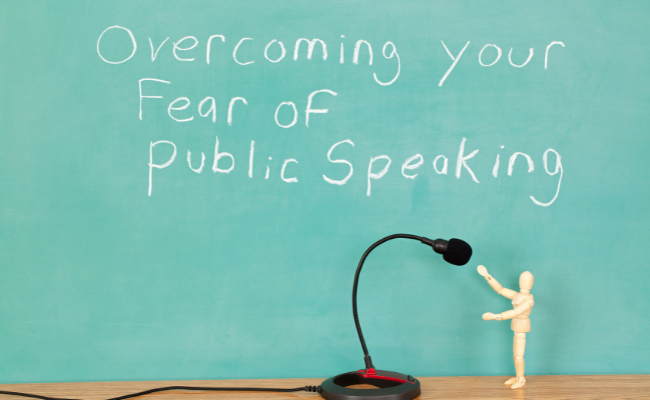Fear of Speaking with Linda Ugelow
“When you look at fear as a pointer to past experiences asking to be resolved or healed, the fear of speaking becomes an opportunity through which we can clear up what holds us back in unseen ways.” – Linda Ugelow
I had the joy of speaking with Linda Ugelow, a speaking empowerment coach, keynote speaker, and the author of Delight in the Limelight.
Linda has over four decades of experience as a performing artist and has spent years helping people get comfortable in their own skin. Using groundbreaking approaches, she helps entrepreneurs, corporate leaders, teams, and authors overcome their dread of the limelight.
We discuss:
- Why the fear of public speaking is common
- A key tool for managing the fear of public speaking
- Why public speaking fear is not the villain
Why the fear of public speaking is common

The teacher calls your name, and you stand with trembling hands. A speech, a presentation, a debate—no matter the reason, the feeling doesn't change. Your chest tightens, your breath stutters, and you can feel every eye on you like a laser.
Everyone has felt the fear of public speaking to one degree or another. Maybe you had a parent that constantly put you on display, or you were in a club that required stage presence. Or perhaps it was those pesky classroom oral essays.
Public speaking is one of the most commonly held fears out there, and it all stems from our relationship with mistakes.
“We live in a society that sets us up for feeling self-conscious and afraid of judgment, of making mistakes, of looking foolish.” Linda shares, “Our educational system is constructed around that. We get graded for making the fewest mistakes, we get the top grades for making no mistakes.”
In most schools, there isn't an atmosphere of experimentation and risk-taking. More often than not, we discourage that thinking in favor of earning a high grade. This tendency extends to the home in many cases.
“Not everybody has had the benefit of a nurturing supportive environment with parents eager to hear what their kids have to say and listen to them.” Linda points out. “A lot of times, they're passing down messages they’ve heard.”
We’ve all heard the old standby, “Children should be seen and not heard,” or even “Don't speak unless spoken to.” Both boil down to: “Your thoughts aren’t important.”
When we grow up with this messaging—explicitly or subconsciously—it only makes sense that putting ourselves in the spotlight can feel threatening to the extreme. If we aren't allowed to make mistakes, experiment, and express ourselves growing up, doing so at a large scale can be crippling.
A key tool for managing the fear of public speaking

Linda was in a program where she would be live over a worldwide broadcast, and she was terrified. As she stood there after weeks of battling this fear during each broadcast, feeling the rise of anxiety and apprehension flood through her body, she was determined to get to the root of them.
“I tried a technique called focusing where you close your eyes and feel inside your body for where that feeling or anxiety resides.” She explains. “I put my hands on my chest and said, ‘Okay, what is this fear trying to say?’”
The focusing technique means following the thread of emotion and tugging on the source, unfurling the memory attached to the fear response.
“What came back was, ‘I'm going to be attacked.’ That came from being attacked by my two older sisters.” Linda continues. “When I was a kid, whenever my mom put me in the center of attention, she would say, ‘Why can't you girls be more like Linda?’ And that was their cue to kick me in the shins and say, ‘Shut up, stupid.’ And that was a recurring theme in my family where my mom favored me visibly and vocally, and they were jealous.”
Although Linda has since healed her relationship with her sisters, those memories affected her in the present—an old pattern of her nervous system used for self-preservation.
Linda realized the fear she felt had nothing to do with being on camera for countless people to see and hear—it had everything to do with what had happened to her when she was the center of attention back then.
If we pay attention to the roots of our emotions, they will reveal wounds and core beliefs we may never have uncovered otherwise. Once Linda understood where her fear came from, she moved beyond it in five days.
Why public speaking fear is not the villain

When we look at fear as pointing to past experiences and messages that are asking to be resolved or healed, it becomes a gift and an opportunity to have a speaking fear because we can clear up past traumas holding us back in unseen ways.
“It's fundamental to clear any of these experiences from the past to heal and resolve them, and it's also important to heal your inner voice because you may be worried about what other people think. You're likely carrying an inner bully.” Linda shares.
Pushing through fear—as many tips and tricks will advise—can be a temporary solution but will not provide long-lasting relief. More often than not, pushing through fear feeds into it and creates more to deal with later.
Yes, it is important to do things when we’re afraid sometimes. But that only works as long as we also take time to understand that fear.
“I don't think that it's in our nature to hate ourselves, to be so demanding.” she continues. “We have a discerning voice, a wise judge. It's up to us to find ways to transform that voice into a voice that's on the same team as the rest of us, so we cultivate an ability to forgive ourselves, and to be understanding and encouraging, to be the best friend that you can be to yourself.”
Fear is not the villain; it’s the messenger.
What does your fear have to say? Are you listening? If you sat with it and examined it, what would you find?
Be sure to check out Linda’s full episode for further insight on facing speaking fear, and learn more at LindaUgelow.com!








